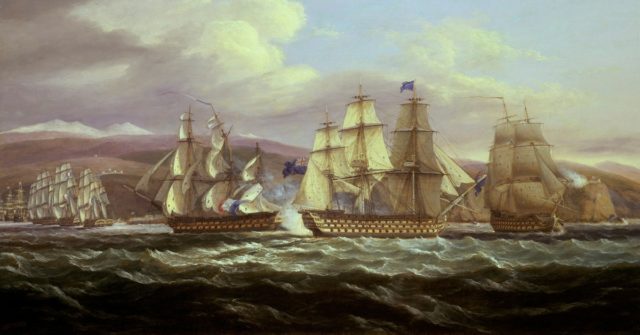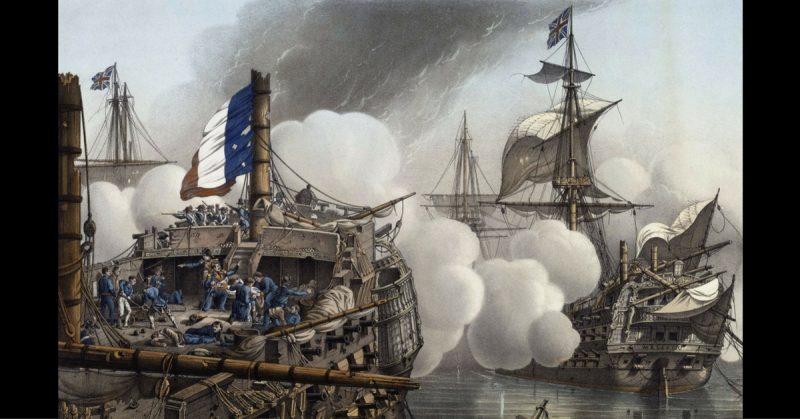In 1806, Napoleon Bonaparte launched a blockade of Great Britain. Merchants from the French Empire and its dependencies were no longer allowed to trade with Britain, and French fleets would prevent others from doing so. Intended to bring his greatest enemy to its knees, instead this policy undermined Napoleon’s Empire.
Why Napoleon Blockaded Britain
Looked at in isolation, the blockade of Britain made perfect sense. Maritime trade played an enormous part in Britain’s economy. Without commerce, it would be difficult for the British to finance and supply the fleets and armies that made them such a formidable military power.
By blocking British industrial exports, Napoleon hoped to cut the country’s income, leading to huge inflation and ruining its economy. Meanwhile, a French continental trade network would take their place.
This was particularly important following the British victory at the Battle of Trafalgar in 1805. The British had shown they were a force to fear. If Napoleon was to continue dominating Europe, he needed to coerce them to make peace.
British Determination
One of the reasons why the blockade began was also a reason why it failed. The British were determined to uphold their position of global dominance, and would not negotiate with Napoleon. British governments under Portland and Pitt refused to come to the table, digging in their heels to fight against an infringement upon British liberties.
The British Attack on Denmark
One of the first British responses to the blockade was an attack on Denmark in 1807. At Copenhagen, the British bombarded the city and seized the Danish fleet, depriving Napoleon of the opportunity to add it to his own naval power.
It was an appalling attack in which thousands of civilians died. It was also enormously successful. The British reinforced their domination of the seas and stopped Napoleon expanding his naval power.
British Diplomatic Pressure
Britain applied diplomatic pressure, pushing friendly countries to ignore and break the blockade. It became a polarizing issue, pushing neutral countries closer to an anti-French stance.
Hard to Enforce
The blockade proved incredibly difficult to enforce. It was one thing for Napoleon to say no-one was allowed to trade with Britain. It was quite another to make that happen.
Theoretically, France controlled vast swathes of Europe and its coastlines in 1806. Much of the continent was controlled by France either directly or indirectly. Some countries were friendly. Others too afraid to defy the French Emperor openly.
France had a massive army with which to enforce its will, but to control on a local level was another matter. The army was active on campaigns, and so could not be used to police the coastlines effectively. What states said they would do and what they did, not necessarily matched. At sea, the dominance of the Royal Navy meant the British repeatedly undermined the intent of the blockade.

Shortages and Price Rises
Once the embargo was in place, shortages and price increases hit France and the countries under her control. How much this was caused by the blockade is debatable. It did not help in obtaining certain goods, but other factors were also at play. War, weather and the upheavals of post-revolutionary society all played a part.
At the very least, the blockade exacerbated existing problems. Whether or not it caused the shortages, people believed it did. The policy became unpopular, encouraging people to defy it and undermining Napoleon’s prestige.
Destroying Maritime Industries
Worst hit were the coastal industries particularly those dealing with traded products, such as tobacco and sugar processing. There were also the industries that supported trade, such as shipbuilding and rope-making.
Again, the decline of these industries was not all Napoleon’s doing. The British were effectively blockading France making it harder for them to trade anywhere. They also stopped French shipping from making the most of the opportunities that remained. The misery spread to major ports in occupied and allied European cities such as Hamburg. A policy meant to challenge British domination of the seas instead reinforced it.
A French Policy for the French
The deepest flaw in the blockade was that it contained a double standard. All the nations of Napoleonic Europe were meant to uphold the embargo, but it protected French interests above those of allies and satellite states. In the economic theories of the time, this made sense. Mercantilism was all about protecting home interests to build a stronger economy.
Politically it was trouble. It stirred resentment against France across Europe. People who might previously have seen Napoleon as an enlightened figure bringing them liberal reforms now saw him as an invader protecting his country at their expense.
It fuelled resentment and resistance against imperial France.
Merchants Undermining the System
Inevitably, traders sought ways to undermine the system. In France and its occupied territories, they saw their interests threatened. They turned to smugglers, intermediaries, and other methods to continue trading through the blockade. It was weakened not just by the limits of government authority but by those who sought to work around that authority.
Triggering Napoleon’s Invasion of Spain
Most importantly, the blockade triggered the invasion of Spain.
The deeply divided Spanish Court was on the verge of ending its alliance with France. It could not be relied upon to enforce the blockade. Portugal too was a major outlet for British goods.
In October 1807, Napoleon invaded Spain and put his brother on the throne before moving on to invade Portugal. This triggered the war that would be his undoing. The French would never find peace in Spain. Spanish irregulars fought a bitter campaign of resistance against them, coining the term guerrilla.
The British landed in Portugal, freeing it in 1808. Together with the Portuguese and Spanish, they forced the French back across the Iberian Peninsula before invading France itself.
The invasion of Spain became a weeping wound in France’s side, drawing off resources needed elsewhere, and eventually leading to Napoleon’s defeat. Like so much about the continental blockade, it was utterly self-defeating.
Sources:
Geoffrey Ellis (1991), The Napoleonic Empire.
Alan Forrest (2011), Napoleon.
